By Andrew Cohen
Eleven African-American Berkeley Law students and alumni were chosen for coveted federal judicial clerkships during the recent hiring cycle, the highest number in school history. It is a truly remarkable figure given the jarring lack of racial diversity within America’s judicial chambers.
Just how remarkable? African Americans held only 36 of the 1,168 nationwide federal clerkships taken by Class of 2009 law school graduates, the last time comprehensive figures were made available by the National Association for Law Placement.
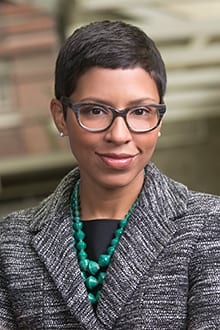
“Our success in channeling minority students into clerkships stems from a broader commitment to improve our clerkship program—a commitment that is evident throughout all parts of our institution,” said Professor and recent Interim Dean Melissa Murray. “In the past six years, we’ve made a concerted effort to expand our clerkship program, stepped up efforts to educate first-generation professional students about clerkships, and improved our relationships with a wide range of judges. Faculty, staff, and alumni have done great work in that regard.”
Murray was the only African-American clerk at the U.S. Court of Appeals for the Second Circuit when she clerked for now-Supreme Court Justice Sonia Sotomayor in 2003-04. She noted that Berkeley Law’s diverse faculty includes seven African-American professors—five of whom each clerked for two federal judges.
“That gives us a broader perspective on the clerkship experience that we can share with all of our students,” Murray said. “It also means we can serve as real-life role models for underrepresented minority students and first-generation students who may not have considered clerking as part of their career paths. Having been clerks ourselves, we know how important it is to level the clerkship playing field.”
That field is woefully tilted. A recent study revealed that Whites made up 58 percent of the students at Top 30 law schools in 2015—but 82 percent of the federal clerks. African Americans made up 6 percent of the students at those schools, but only 4 percent of the federal clerks. And while the percentage of Asian and Hispanic federal clerks rose (albeit slightly) from 1993 to 2015, the percentage of African-American federal clerks declined.
“Black people are those most victimized by the judicial system, and the criminal justice system in particular, yet they’re the ones furthest from positions of advocacy and decision-making,” said Luke Apfeld ’18, who secured clerkships for the 2018-19 and 2019-20 terms. “The best way to change the law is to understand it at the highest level—to know what goes into creating it, maintaining it, and making it just. Clerking allows us to accomplish that.”
All hands on deck
Career Development Office Director of Operations Eric Stern manages all aspects of the school’s Judicial Clerkship and Judicial Relations Program, along with Professors Amanda Tyler and Andrew Bradt, the current Clerkship Committee co-chairs. Stern points to an “all hands on deck” approach for Berkeley Law bucking the national trend when it comes to African-American clerks. He said faculty such as Murray, Tyler, Bradt, Russell Robinson, Bertrall Ross, Saira Mohamed, Avani Sood, Mark Gergen, Karen Tani, Anne Joseph O’Connell, Kristen Holmquist, and Christopher Edley “were instrumental” in talking with judges and advising applicants.
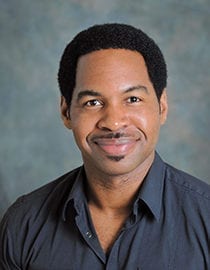
Robinson said two of his African-American professors at Harvard Law, Charles Ogletree and Randall Kennedy, “played critical roles in my clerkship hiring process.” He clerked for Ninth Circuit Judge Dorothy Nelson and Supreme Court Justice Stephen Breyer, which Robinson credits for honing his legal analysis and writing skills—and boosting his confidence.
“After arguing, politely, with a Supreme Court Justice and holding my own, I felt prepared for any challenge the legal profession could bring,” he said. “Given how clerking blessed my career and life, I’ve tried to encourage and support Berkeley’s potential clerkship applicants with a special, but not exclusive, focus on students of color. Too often, they’re less aware of the opportunities that clerkships offer.”
Exhibit A: A few years ago, Sotomayor and fellow Supreme Court Justice Clarence Thomas visited their alma mater, Yale Law School. During a question and answer session, a student asked why they had not clerked after law school.
“Their responses were alarming,” Tyler said. “In essence, both said that they did not know what clerking was and how important it was to launching a successful legal career. The mission of our Clerkship Committee is to ensure that no student who passes through the halls of Berkeley Law will ever say such a thing.”
Cara Sandberg ’12 was inspired to pursue a clerkship after Sotomayor visited with Berkeley’s Women of Color Collective in 2011. “She told us that her biggest regret from her early career was that she did not serve as a judicial clerk. Hearing about the importance of clerking from a Supreme Court Justice inspired me,” said Sandberg, who clerked for First Circuit Judge O. Rogeriee Thompson and Northern District of California Judge Susan Illston.
Alumni play leading role
Tyler also hailed the “major time investment” of former alumni clerks as a key factor in Berkeley Law’s clerkship success, particularly helping candidates to navigate the application process.
“I aim to provide law students and young lawyers with the information they may not be able to get elsewhere,” said Sandberg, who supervised judicial externs for three years. “What’s expected of a federal clerk on a daily basis? What skills they should hone to make themselves a competitive applicant and an efficient clerk? How should they prepare for an interview? What’s their application strategy?”
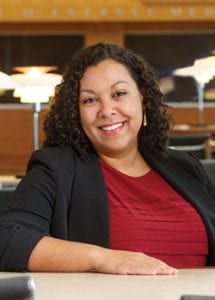
Sandberg also advised students to extern for a judge during their 2L or 3L year to develop practical skills for clerking. She tells them “the best way they can thank me for my assistance is to help someone else when they’re in a position to do so. I think this is what makes Berkeley Law so exceptional—the culture of supporting and encouraging students to achieve their goals.”
Initiatives that support social justice-oriented students, students of color, and first-generation professionals have helped the school reach unprecedented heights in placing clerks over the past four years. In the 2017-18 term, 89 students and graduates will clerk in 23 different states and The Hague. That includes U.S. Supreme Court clerks Greg Miller ’12 (Thomas) and Karim Kentfield ’12 (Justice Ruth Bader Ginsburg).
“I’m proud that Berkeley plays a leading role in diversifying the pool of judicial clerks,” said Stephen Wilson ’18, who will clerk next year for Sixth Circuit Judge Deborah Cook. “I’m hopeful that my peers will return to the issue of judicial diversity, either by pursuing a career on the bench themselves, or by encouraging others who might make our state and federal courts more representative.”
Here is a look at Berkeley Law’s new roster of African-American clerks:
CURRENT STUDENTS
Luke Apfeld ’18
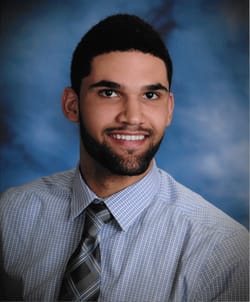 Judges: Andrew Carter, U.S. District Court, Southern District of New York (2018-19); John Owens, U.S. Court of Appeals for the Ninth Circuit (2019-20).
Judges: Andrew Carter, U.S. District Court, Southern District of New York (2018-19); John Owens, U.S. Court of Appeals for the Ninth Circuit (2019-20).- College: University of Vermont, B.A., English and Sociology (2013); Master’s, Education and Policy Analysis (2014).
- Law School Activities: Admissions Committee; Berkeley Business Law Journal; Berkeley Journal for Entertainment & Sports Law; California Law Review; East Bay Community Law Center – Youth Defender Clinic; Law Students of African Descent.
- FYI: Interned at the U.S. Senate Judiciary Committee … former Division 1 college basketball player … summer associate at Keker, Van Nest & Peters in San Francisco.
- Quote-worthy: “As an African-American man, we are extremely overrepresented as victims of the judicial system and extremely underrepresented in all decision-making positions of that system. I want to help flip that script.”
Djenab Conde ’19
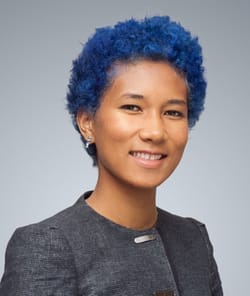 Judges: Victor Bolden, U.S. District Court, District of Connecticut (2019-20); Paul Watford, U.S. Court of Appeals for the Ninth Circuit (2020-21).
Judges: Victor Bolden, U.S. District Court, District of Connecticut (2019-20); Paul Watford, U.S. Court of Appeals for the Ninth Circuit (2020-21).- College: Yale University (2015), B.A., Psychology.
- Law School Activities: Asian Pacific American Law Students Association; Berkeley Business Law Journal; Berkeley Technology Law Journal; California Law Review; International Human Rights Workshop; Juvenile Education Advocacy Project; Law Students of African Descent; research assistant for Professor Amanda Tyler; Women of Color Collective.
- FYI: Speaks four languages … worked as a program coordinator at GlobalGirl Media in Casablanca, Morocco … summer associate at Irell & Manella in Los Angeles.
- Quote-worthy: “A diverse perspective can help tilt the balance towards a more just and fair result, especially when we look at the many racial and other disparities in convictions, pleas, and sentencing.”
Chante Westmoreland ’18
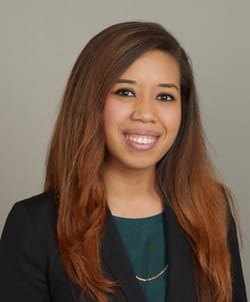 Judge: Andrew Hanen, U.S. District Court, Southern District of Texas (2018-19).
Judge: Andrew Hanen, U.S. District Court, Southern District of Texas (2018-19).- College: Colorado State University (2012), B.A., Liberal Arts (English minor).
- Law School Activities: Karuk-Berkeley Collaborative; Berkeley Entertainment & Sports Law Journal; Berkeley Technology Law Journal; California Law Review.
- FYI: Founder and host of the Berkeley Technology Law Journal student podcast, “Do You Even Have a Tech Degree?” … joined Teach for America and spent three years as a teacher and coach in San Antonio before law school … plays on Berkeley Law’s intramural volleyball team.
- Quote-worthy: “I spent last semester externing for a federal judge, and I really enjoyed the work. I was particularly interested in clerking for Judge Hanen because of his reputation for letting the law, rather than a political agenda, decide his cases.
Kristoff Williams ’18
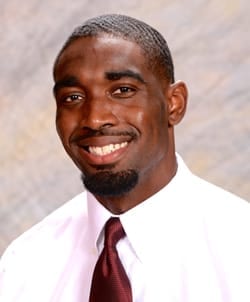 Judges: Algenon Marbley, U.S. District Court, Southern District of Ohio (2018-19); Gerswhin Drain, U.S. District Court, Eastern District of Michigan (2019-20).
Judges: Algenon Marbley, U.S. District Court, Southern District of Ohio (2018-19); Gerswhin Drain, U.S. District Court, Eastern District of Michigan (2019-20).- College: Washington State University (2014), B.A., Criminal Justice.
- Law School Activities: Boalt Police Review Project; Christians at Boalt; East Bay Community Law Center – Youth Defender Clinic; Juvenile Hall Outreach Program; Law Students of African Descent.
- FYI: Former Division 1 college football player … law clerk at the Alameda County Public Defender’s Office … won Berkeley Law’s 2016 Bales Mock Trial Competition.
- Quote-worthy: “Personally, it’s troubling to see such a low number of African-American males occupying clerkships. Fortunately, I was blessed to have professors and alumni law clerks who advocated for me, and I promise to do the same for those who come behind me.”
Stephen Wilson ’18
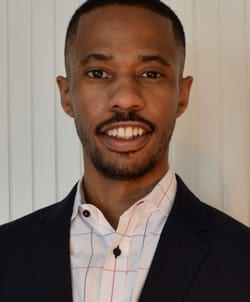 Judge: Deborah Cook, U.S. Court of Appeals for the Sixth Circuit (2018-19).
Judge: Deborah Cook, U.S. Court of Appeals for the Sixth Circuit (2018-19).- College: Washington & Lee University (2012), B.A., Politics and Studio Art – Photography.
- Law School Activities: Admissions Committee; Berkeley Technology Law Journal; Law Students of African Descent; Queer Caucus.
- FYI: Summer associate at Boies Schiller Flexner in Oakland … joined Teach for America and taught fourth grade in Atlanta for two years before law school … father was a family court judge in South Carolina.
- Quote-worthy: “If only to bolster public confidence in the legal system, the federal bench should be more representative of society’s diversity. At Boalt, experience and personal history are critical to how my classmates and professors approach their work. I believe the same is true for attorneys, judges, and their clerks.”
THIS YEAR’S GRADUATES
Christina Randall ’17
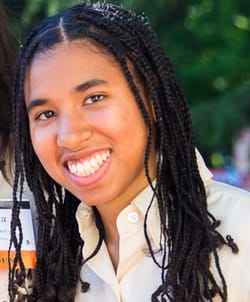 Judge: Vanessa Gilmore, U.S. District Court, Southern District of Texas (2017-18).
Judge: Vanessa Gilmore, U.S. District Court, Southern District of Texas (2017-18).- College: Rice University (2014), B.A., Asian Studies and German Studies.
- Law School Activities: California Asylum Representation Clinic; International Human Rights Law Clinic; research assistant for Professor David Oppenheimer.
- FYI: Won two prizes from Rice’s German Studies Department … graduated from Berkeley Law with a Certificate of Specialization in International Law … received the school’s annual Eleanor D. and Irving G. ’45 Tragen I-House Fellowship in 2016.
- Quote-worthy: “I knew I wanted to work for Judge Gilmore once I heard that she decided to enter law many years ago after she tried a case herself against her landlord and succeeded. The drive to know what one wants, access the relevant resources, and put in the work to obtain the result is something that I admire greatly.
Esther Townes ’17
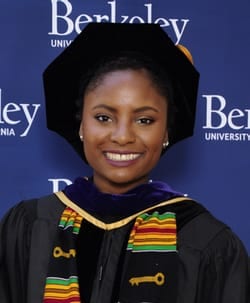 Judge: Solomon Oliver, Jr., U.S. District Court, Northern District of Ohio (2017-18).
Judge: Solomon Oliver, Jr., U.S. District Court, Northern District of Ohio (2017-18).- College: Pepperdine University (2013), B.A., Economics.
- Law School Activities: Boalt Hall Student Association; Board of Advocates; California Law Review; Law Students of African Descent.
- FYI: Graduated from high school and Solano Community College at the same time and finished college 2½ years later … managed Pepperdine’s Office of International Student Services … Spent the fall semester last year as a legal extern at the International Maritime Organization in London.
- Quote-worthy: “I appreciate the difference it can make to have someone who looks like you in positions of power generally, or in positions to which you aspire. Representation matters. I’m honored to have the opportunity to move the needle in the right direction.”
Gregory Washington ’17
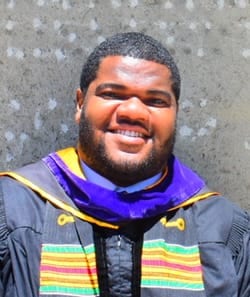 Judge: Victor Bolden, U.S. District Court, District of Connecticut (2018-19).
Judge: Victor Bolden, U.S. District Court, District of Connecticut (2018-19).- College: Cal State Fullerton (2012), B.A., Political Science and Communication Studies.
- Law School Activities: Admissions Committee; Boalt Hall Student Association; California Law Review; Law Students of African Descent; research assistant for Professor David Oppenheimer.
- FYI: Senior research fellow at the California Constitution Center … won Berkeley Law’s 2017 McBaine Honors Moot Court Competition … worked for two years at the California Department of Finance helping the state implement the Affordable Care Act.
- Quote-worthy: “Throughout law school, I became very interested in litigation work. I knew that the best way to become a successful litigator is to understand how judges make decisions, so I knew that clerking would be a great move for me.
OTHER ALUMNI
Antonio Ingram ’14
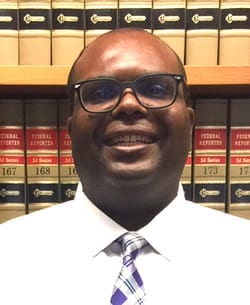 Judge: Roger Gregory, U.S. Court of Appeals for the Fourth Circuit (2018-19).
Judge: Roger Gregory, U.S. Court of Appeals for the Fourth Circuit (2018-19).- College: Yale University (2011), B.A., Religious Studies.
- After Berkeley Law: Litigation associate, Morrison & Foerster (Nov. 2014-July 2016); current clerkship, Judge Ivan Lemelle, U.S. District Court, Eastern District of Louisiana.
- FYI: Will soon begin a 10-month Public Policy Fulbright Fellowship in Malawi … had summer internships in Costa Rica and Israel … spent a semester of his 3L year working at the Public Defender Office in Washington, D.C.
- Quote-worthy: “As a first-generation professional from a working-class household, I wanted to become a law clerk in order to ensure that perspectives of my community are represented in the judiciary. We need a judiciary that reflects the population it is serving.”
Syreeta Tyrell ’14
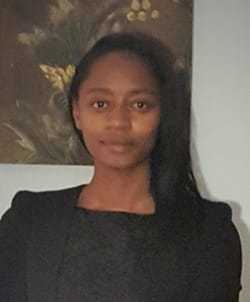 Judge: Miranda Du ’94, U.S. District Court, District of Nevada (2018-20).
Judge: Miranda Du ’94, U.S. District Court, District of Nevada (2018-20).- College: Arizona State University (2010), B.S., Political Science (African Studies minor).
- After Berkeley Law: Research assistant, Haas Institute for a Fair and Inclusive Society (Jan. 2014-July 2015); two clerkships at the Arizona Court of Appeals, including current stint with Judge Jon Thompson.
- FYI: Born in Jamaica and taught third grade there before law school … helped crime victims prosecute their cases at the Maricopa County Attorney’s Office in Phoenix … former Berkeley Journal of African-American Law & Policy senior executive editor.
- Quote-worthy: “I think clerking is the best way to enhance your abilities, build confidence in yourself, and enter the legal profession as an intellectually curious and knowledgeable advocate. It’s also a great way to be of service to others.”
Keith Williams ’16
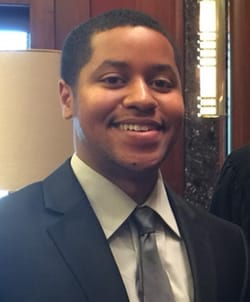 Judge: Damon Keith, U.S. Sixth Circuit Court of Appeals (2017-18).
Judge: Damon Keith, U.S. Sixth Circuit Court of Appeals (2017-18).- College: University of Southern California (2012), B.S., Business Administration and International Relations.
- After Berkeley Law: Clerking for Judge Gerald Lee, U.S. District Court, Eastern District of Virginia (2016-present).
- FYI: Worked in the operations department of an engineering firm in Sacramento between college and law school … coordinates a summer internship program and clerkship hiring program for the Just the Beginning Foundation, which promotes diversity in the legal profession … plans to pursue pro bono initiatives focused on education and civil rights.
- Quote-worthy: “Working for a judge exposes you to a wide variety of legal topics and forces you to intensely research and write. If you’re interested in litigation, clerking can serve as invaluable training as you begin your career. Moreover, the judge you work for will become a lifelong mentor.”